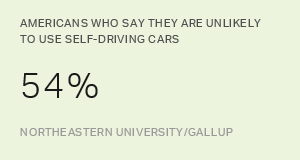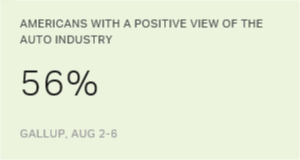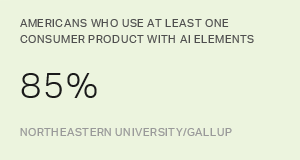Story Highlights
- 53% say driverless cars will be common within 10 years
- 69% say they would have a positive impact on the elderly or disabled
- Public divided over driverless cars' effects on auto industry and traffic
WASHINGTON, D.C. -- A slim majority of Americans, 53%, believe fully automated, driverless cars will be commonly used in the U.S. within the next 10 years, a goal that automobile manufacturers and technology companies are working tirelessly to achieve. Beyond that, 28% think the technology won't be ready for 11 to 20 years, and 15% say it will take even longer.
| U.S. adults | |||||||||||||||||||||||||||||||||||||||||||||||||||||||||||||||||||||||||||||||||||||||||||||||||||
|---|---|---|---|---|---|---|---|---|---|---|---|---|---|---|---|---|---|---|---|---|---|---|---|---|---|---|---|---|---|---|---|---|---|---|---|---|---|---|---|---|---|---|---|---|---|---|---|---|---|---|---|---|---|---|---|---|---|---|---|---|---|---|---|---|---|---|---|---|---|---|---|---|---|---|---|---|---|---|---|---|---|---|---|---|---|---|---|---|---|---|---|---|---|---|---|---|---|---|---|
| % | |||||||||||||||||||||||||||||||||||||||||||||||||||||||||||||||||||||||||||||||||||||||||||||||||||
| Within 5 years | 19 | ||||||||||||||||||||||||||||||||||||||||||||||||||||||||||||||||||||||||||||||||||||||||||||||||||
| 6-10 years | 34 | ||||||||||||||||||||||||||||||||||||||||||||||||||||||||||||||||||||||||||||||||||||||||||||||||||
| 11-15 years | 18 | ||||||||||||||||||||||||||||||||||||||||||||||||||||||||||||||||||||||||||||||||||||||||||||||||||
| 16-20 years | 10 | ||||||||||||||||||||||||||||||||||||||||||||||||||||||||||||||||||||||||||||||||||||||||||||||||||
| Longer than that | 15 | ||||||||||||||||||||||||||||||||||||||||||||||||||||||||||||||||||||||||||||||||||||||||||||||||||
| Gallup, April 23-29, 2018 | |||||||||||||||||||||||||||||||||||||||||||||||||||||||||||||||||||||||||||||||||||||||||||||||||||
These results, from an April 23-29 Gallup poll, supplement findings from a 2017 Northeastern University/Gallup survey of Americans' attitudes toward artificial intelligence showing the public to be generally uncomfortable with self-driving vehicles. Specifically, that survey found 23% of Americans are comfortable with the idea of riding in a self-driving car on a daily basis, and 59% are uncomfortable with it.
The public's predictions of when driverless cars will be commonly used are fairly similar across subgroups, although there are modest differences based on age and region. Americans in the youngest and oldest age groups (18 to 29 and 65 and older) are somewhat less likely than those aged 30 to 64 to say driverless technology will be common in the next decade.
Americans in the Western U.S. are more likely than those in any other region to say the technology will become common within 10 years. Two Western states, California and Arizona, have led the way in testing driverless vehicles on their roads, undoubtedly leading to a higher level of awareness in that region.
Americans Skeptical of Safety of Self-Driving Cars
One of the key selling points for driverless cars is safety -- specifically, that autonomous cars with constantly vigilant computers will ultimately be safer than those driven by often-distracted humans. Americans, however, aren't yet sold on that argument. In the latest poll, Americans were asked which level of driverless car use would make U.S. roads the safest. The choices included use of only human-operated cars, use of mostly human-operated cars with some driverless cars, an equal mix of both, mostly driverless cars or only driverless cars. A 47% plurality think the safest option is having only or mostly human-operated cars on U.S. roads, while 28% think having only or mostly driverless cars would be safest.
Given the same choices, respondents were also asked to choose the least safe option. These results were more closely divided, with 40% saying all or mostly driverless cars on the road would be least safe and 34% saying the same of all or mostly human-operated cars.
Roughly a quarter (24%) say that an equal mix of driverless and human-operated cars would be the safest option, and the same percentage say this would be the least safe option. This scenario most closely approximates what would likely happen first as driverless cars are introduced into the driving landscape. Figuring out how this new technology can coexist with cars operated by humans is and will continue to be one of the many challenges that society will have to confront.
| All human-operated | Mostly human-operated | Equal mix | Mostly driverless | All driverless | |||||||||||||||||||||||||||||||||||||||||||||||||||||||||||||||||||||||||||||||||||||||||||||||
|---|---|---|---|---|---|---|---|---|---|---|---|---|---|---|---|---|---|---|---|---|---|---|---|---|---|---|---|---|---|---|---|---|---|---|---|---|---|---|---|---|---|---|---|---|---|---|---|---|---|---|---|---|---|---|---|---|---|---|---|---|---|---|---|---|---|---|---|---|---|---|---|---|---|---|---|---|---|---|---|---|---|---|---|---|---|---|---|---|---|---|---|---|---|---|---|---|---|---|---|
| % | % | % | % | % | |||||||||||||||||||||||||||||||||||||||||||||||||||||||||||||||||||||||||||||||||||||||||||||||
| Which of the following do you think would be the safest option on U.S. roads? | 29 | 18 | 24 | 10 | 18 | ||||||||||||||||||||||||||||||||||||||||||||||||||||||||||||||||||||||||||||||||||||||||||||||
| Which of the following do you think would be the least safe option on U.S. roads? | 22 | 12 | 24 | 11 | 29 | ||||||||||||||||||||||||||||||||||||||||||||||||||||||||||||||||||||||||||||||||||||||||||||||
| Gallup, April 23-29, 2018 | |||||||||||||||||||||||||||||||||||||||||||||||||||||||||||||||||||||||||||||||||||||||||||||||||||
Westerners are divided as to whether more driverless cars on the road (36%) or more human-operated cars on the road (34%) is safer, but those in the other regions show a clearer preference for all or mostly human-operated as being safer, with close to half saying this.
College graduates and adults with an annual household income of $90,000 or more are relatively more positive than their counterparts about the safety of driverless cars. These groups are roughly split in saying mostly or all driverless cars would be safest versus having mostly or all human-operated cars. By contrast, non-college graduates and adults with a household income of less than $90,000 are twice as likely to say relying on human-operated cars would be safer than relying on driverless cars.
Americans Divided on Effects of Driverless Cars
Automakers and technology companies that produce driverless cars tout a number of potential benefits, including increased independence for those who cannot drive, fewer traffic accidents and fatalities, less pollution, and easing traffic congestion. Yet, for the most part, Americans are divided in their opinions about whether these benefits will result from the use of self-driving cars.
Assisting elderly and disabled people in getting around is the only measure tested by Gallup that receives a majority saying it would be a positive impact of self-driving cars. Pluralities of more than four in 10 Americans think the technology will have a positive effect on the number of car accidents and fatalities and on the quality of the environment. The public is closely divided over whether effects on traffic congestion and the U.S. auto industry would be positive or negative.
| Mostly positive | Neither positive nor negative | Mostly negative | |||||||||||||||||||||||||||||||||||||||||||||||||||||||||||||||||||||||||||||||||||||||||||||||||
|---|---|---|---|---|---|---|---|---|---|---|---|---|---|---|---|---|---|---|---|---|---|---|---|---|---|---|---|---|---|---|---|---|---|---|---|---|---|---|---|---|---|---|---|---|---|---|---|---|---|---|---|---|---|---|---|---|---|---|---|---|---|---|---|---|---|---|---|---|---|---|---|---|---|---|---|---|---|---|---|---|---|---|---|---|---|---|---|---|---|---|---|---|---|---|---|---|---|---|---|
| % | % | % | |||||||||||||||||||||||||||||||||||||||||||||||||||||||||||||||||||||||||||||||||||||||||||||||||
| The ability for elderly or disabled people to get around | 69 | 10 | 21 | ||||||||||||||||||||||||||||||||||||||||||||||||||||||||||||||||||||||||||||||||||||||||||||||||
| The number of deaths in car accidents | 44 | 20 | 33 | ||||||||||||||||||||||||||||||||||||||||||||||||||||||||||||||||||||||||||||||||||||||||||||||||
| The number of car accidents | 44 | 17 | 36 | ||||||||||||||||||||||||||||||||||||||||||||||||||||||||||||||||||||||||||||||||||||||||||||||||
| The quality of the environment | 41 | 32 | 24 | ||||||||||||||||||||||||||||||||||||||||||||||||||||||||||||||||||||||||||||||||||||||||||||||||
| Traffic congestion | 39 | 24 | 34 | ||||||||||||||||||||||||||||||||||||||||||||||||||||||||||||||||||||||||||||||||||||||||||||||||
| The U.S. auto industry | 37 | 24 | 37 | ||||||||||||||||||||||||||||||||||||||||||||||||||||||||||||||||||||||||||||||||||||||||||||||||
| Gallup, April 23-29, 2018 | |||||||||||||||||||||||||||||||||||||||||||||||||||||||||||||||||||||||||||||||||||||||||||||||||||
Still, Americans are more likely to say driverless cars would have a positive than negative impact on five of six aspects rated. They are evenly divided on the effect the technology would have on the auto industry.
Implications
While some analysts predict that 10 million self-driving cars will be on the road by 2020, others make much more conservative estimates. A slim majority of Americans currently see self-driving cars on the near horizon, and the vast majority expect them to be commonly used within the next two decades. But there is little consensus on the effects this new technology will have on Americans' lives or society in general.
Several recent highly publicized accidents involving driverless technology have no doubt done little to improve the public's comfort level with these cars. However, just as has occurred with the adoption of other technologies such as cellphones, televisions, computers and microwave ovens, gradual increases in familiarity may cause support and interest to snowball, particularly if the purported benefits to auto safety, traffic congestion and convenience become evident.
Survey Methods
Results for this Gallup poll are based on telephone interviews conducted April 23-29, 2018, with a random sample of 1,503 adults, aged 18 and older, living in all 50 U.S. states and the District of Columbia. For results based on the total sample of national adults, the margin of sampling error is ±3 percentage points at the 95% confidence level. All reported margins of sampling error include computed design effects for weighting.
Each sample of national adults includes a minimum quota of 70% cellphone respondents and 30% landline respondents, with additional minimum quotas by time zone within region. Landline and cellular telephone numbers are selected using random-digit-dial methods.
View survey methodology, complete question responses and trends.
Learn more about how the Gallup U.S. Poll works.





